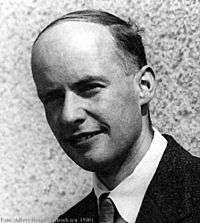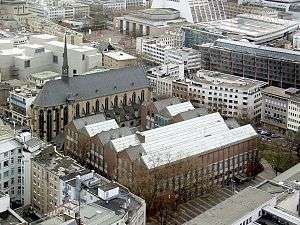Rudolf Schwarz (architect)


Rudolf Schwarz (15 May 1897, Strasbourg – 3 April 1961, Cologne) was a German architect known for his work on Kirche St. Fronleichnam, Aachen. He also played a decisive role in the reconstruction of Cologne after the Second World War. After conducting Cologne's reconstruction authority between 1947 and 1952 he contributed to the rebuilding of the city with his buildings. Among them is the Wallraf-Richartz Museum (1956), which now houses the Museum of Applied Art. He also reconstructed the pilgrimage church of Saint Anne in Düren, near Aachen, which is probably his most famous work.
Schwarz worked with the German blacksmith Carl Wyland and closely with the Fr. Romano Guardini at Burg Rothenfels, where he designed the chapel for Quickborn, a large German Catholic youth movement run by Guardini. His wife, Maria Schwarz, worked together with him and is still in business as an architect, especially in reconstructing and modifying her husband's buildings.
References
Hendrik Brixius. "Kirche St. Fronleichnam Aachen (Architekt Rudolf Schwarz)" (in German). Hendrik.Brixius. Retrieved 2007-08-18.
- Steven J. Schloeder, Architecture in Communion: Implementing the Second Vatican Council through Liturgy and Architecture. San Francisco: Ignatius Press, 1998: 23-24 and 234-38. ISBN 0-89870-631-9.
- Adam Caruso, Helen Thomas (Hg.): Rudolf Schwarz and the Monumental Order of Things. gta Verlag, Zürich 2016, ISBN 978-3-85676-362-6.
External links
| Wikimedia Commons has media related to Rudolf Schwarz. |
- Johannes Madey (1999). "Schwarz, Rudolf". In Bautz, Traugott. Biographisch-Bibliographisches Kirchenlexikon (BBKL) (in German). 16. Herzberg: Bautz. col. 1431. ISBN 3-88309-079-4.
- Rudolf Schwarz in the German National Library catalogue
- Rudolf Schwarz (architect) at the archINFORM database.